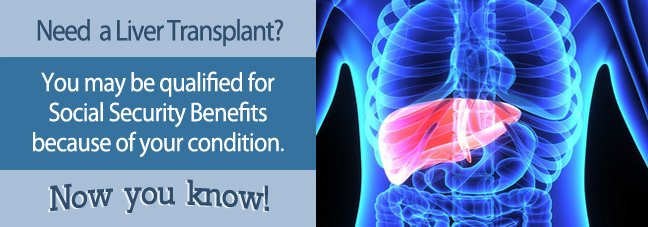Liver disease is not a single condition but could be any one of a number of health problems related to reduced functional capacity of the liver.
Serious liver disease is very likely to lead to functional limitations, which is a term referring to your reduced inability to perform normal tasks, whether these are related to work or at home.
Symptoms of liver disease are very varied and are related to what has caused the liver to start to fail.
Some symptoms of liver disease include internal bleeding, swelling in the brain, accumulation of fluid in the abdomen and chest cavity, sweating profusely, fainting, vomiting, pale skin and a rapid pulse.
Any combination of symptoms experienced due to severe or chronic liver disease may mean it becomes impossible to remain at work or carry out normal daily tasks.
Qualifying For Disability Benefits With a Functional Limitation
Several different liver diseases are listed in the SSA’s Blue Book under section 5.00 which describe liver related diseases. These include cirrhosis of the liver and hepatitis (5.05), liver disease causing severe weight loss (5.08) and post surgery after a liver transplant (5.09).
In some circumstances, liver disease may be a secondary condition and caused by another health complication which has its own listing. There are also circumstances in which no Blue Book match can be found at all.
If no Blue Book listing can be found which matches your condition, the SSA may consider granting a disability benefit under a medical vocational allowance after a residual functional capacity (RFC) assessment made by a qualified physician and careful examination of all medical documentation that you have accumulated.

What to Expect When Applying For SSD with a Medical Vocational Allowance
When applying for a disability benefit through the medical vocational allowance pathway you will need to have an RFC assessment.
This is performed by a doctor who tests your ability to carry out a number of physical tasks to determine just how much you can do and not do, i.e. what are your functional limitations due to the level of severity of the liver disease.
The RFC may use tests of your ability to lift, carry, bend and stand to determine whether you can do any kind of work at all. SSA medical assessors will also look at other factors such as your work history, age, gender, educational qualifications etc. to help them decide if you can do any kind of work.
Next Steps to Take
The SSA will look at a range of evidence which shows just how severe your liver disease has become, which Blue Book listing, if any, it matches, and other criteria such as an RFC assessment. Evidence the SSA will examine includes:
- Lengthy medical history detailing the development of the liver disease;
- Incidences of hospitalization and visits to ER;
- Surgical notes;
- Biopsy analysis;
- Liver value lab results;
- Imaging results, such as MRI scans.
A Disability Attorney Increases Your Chances of Success
It is not easy obtaining any kind of disability benefit as the criteria are so exacting and thorough. It can be of real help using the legal expertise of an experienced disability attorney.